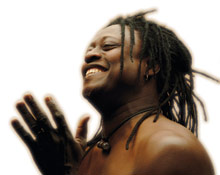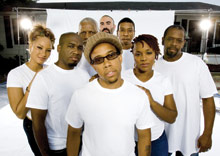The Lake Eden Arts Festival has a proud history of bringing performers from around the globe to Black Mountain’s Camp Rockmont. This season alone boasts a Cuban jam session, salsa and Aztec dances, and artists from Ireland, the Virgin Islands, Japan, Iraq, Rwanda, Bangladesh and Russia—and that’s just for starters.

But to call LEAF a world-music festival is to skim the surface of this multicultural, multidisciplinary arts celebration. After all, to classify everything that doesn’t land on the American and British music charts as “world” music is to lump together genres from zouk (rhythms from Guadeloupe and Martinique) and rigsar (popular music of Bhutan) to gabber (Dutch hardcore techno) and J-pop (jazz-informed Japanese Top-40).
Still, as far-flung as these music styles are, their performers find common ground on the world stage.
“To me, hip-hop, world music, roots and folk all have the same message,” says Atlanta, Ga.-based performer Speech—the front man of longtime hip-hop collective Arrested Development, which is headlining LEAF Friday night. “Hip-hop comes from people who are downtrodden: the Third World of America. Song becomes their voice, same as in roots and reggae.”

It’s telling that Speech’s views are echoed by another performer whose musical roots are half a globe away.
“People say ‘world music.’ That means music from one part of the world can bring people together,” says Malian pop star Habib Koité, whose Saturday stop at LEAF rounds out the first leg of his American tour.
Blues clues
Though the landlocked West African nation of Mali is far from a cosmopolitan nexus, an increasing number of its talented musicians have gained cross-cultural notoriety. Salif Keita, Oumou Sangare and duo Amadou et Mariam can all be found filed under “Afro-pop,” though Koité claims Malians “don’t have a name for that music.”
He tells Xpress that the American romance with Malian music began with late guitarist Ali Farka Touré, who was famously compared with American bluesman John Lee Hooker and sonically bridged the worlds of Malian folk tunes and American blues.
“The American crowd is able to hear the music from Mali because [it sounds similar to] the blues,” Koité notes. That idea is supported by filmmaker Martin Scorsese’s assessment of Touré‘s sound as “the DNA of the blues.” The concept is explored in Scorsese’s 2003 documentary The Blues—A Musical Journey, as well as the Putumayo compilation Memphis to Mali (which draws comparisons between African and American roots musicians) and the disc Mississippi to Mali by musician Corey Harris (who also performs at this season’s LEAF).
Despite having met Scorsese (“I played for him, and he danced,” Koité recalls), the Malian musician wants to bust the myth: “The American people think they play blues in Mali, but those guys don’t know the blues.”
Speech wants to bust a few myths of his own. “I don’t think of Arrested Development’s music as ‘positive,’ though I know people tend to,” he tells Xpress. “I think of our music as honest, with a solution stance.” But as for championing positive hip-hop, “We don’t have that weight on our shoulders.”
This might be surprising to fans of Arrested Development’s 1992 feel-good debut, 3 Years 5 Months & 2 Days in the Life of. That disc burst on the scene during the ascendance of aggressive gangsta rap, offering eloquent, life-affirming tracks such as “Mr. Wendal” and “Give a Man a Fish.”
The Afrocentric lyrics (largely penned by Speech), bohemian sensibilities and multiethnic embrace may have positioned Arrested Development ahead of its time, though the band likely paved the way for later positive pop crossover projects like last year’s LEAF headliners Les Nubians and Michael Franti.
Between 1996 and 2000, members of Arrested Development pursued solo projects. Eight years ago, the group reunited for European and Japanese concerts, but a dozen years passed before they returned to U.S. stages. Like their 2007 release, Since the Last Time, says, “Old routines we did came back so lucid, we was boosted, we juiced it.”
Jet lag
Juiced as they are (and Time demonstrates plenty of juice while dropping beats, gorgeously melodic hooks and uplifting lyrics), Arrested Development has seen plenty of change in the past decade. Speech is now an ordained minister at the nondenominational Greater Atlanta Church of Christ, a vocation he insists makes him a more compassionate leader when it comes to his band. His soon-to-be-released solo album, The Grown Folks Table, introduces Christian ideology to his rapping, but religion only accounts for part of the artist’s personal growth. On the subject of world travel, Speech says, “It’s revolutionized my life.”
“I think I finally started to understand that I’m part of this sea of humanity,” he continues. “I don’t think everyone gets that—we tend to think we’re all so different. Travel has shown me that’s not true: We’re all just people.”
Koité echoes the sentiment. “We are all human, we are all the same,” he says, “but the lifestyle is different.” Forget that “We Are the World” mentality for a moment; the almost homesick-sounding musician still longs for the relative simplicity of village life in his homeland. “Sometimes the American people come to Mali with the Peace Corps and they discover a very different style of life when they stay in the small village,” he says.
“Guys like me are on the road all the time. I have to think what is the best place for me. It’s in Africa, in Mali, with my wife and kids.” If the African guitarist sounds melancholy, it’s probably because he finds writing and recording music difficult when jetting around the globe. His most recent release, Afriki, took six years to come to fruition.
“Last year I traveled a lot, a lot,” he recalls. “I waited to go home, to be in my area to create. But I never went home!” Thanks to a laptop and music-production software, he’s able to record on the road, but for Koité, that’s not ideal. Fans, however, won’t be disappointed. Afriki features more of the lush grooves, intricate instrumentation and sweeping vocals that make Koité such a favorite with American audiences.
LEAF headliners
The following events take place at the Lakeside Main Stage.
Friday, May 9
• Secret Agent 23 Skidoo (kid-friendly hip-hop), 5:30-6:30 p.m.
• Corey Harris and the 5×5 Band (reggae and blues), 7-8 p.m.
• Arrested Development (hip-hop), 8:30-10 p.m.
• Bambu Station (reggae), 10:30 p.m.-midnight
Saturday, May 10
• Big Sandy and his Fly-Rite Boys (swing), 1-2 p.m.
• Buille (traditional Irish), 4-5:30 p.m.
• Habib Koité and Bamada (Malian pop), 6-7:30 p.m.
• Javier Garcia (Latin), 8-9:30 p.m.
• Big Sam’s Funky Nation (funk), 10-11:30 p.m.
Sunday, May 11
• Rahim Alhaj (Iraqi oud master), 11-11:30 a.m.
• Kellin Watson (singer/songwriter), 11:45 a.m.-12:45 p.m.
• Charmaine Neville (jazz and blues), 1:15-2:15 p.m.
• Steep Canyon Rangers (bluegrass), 2:45-3:45 p.m.
• Nanci Griffith (country), 4:15-5:45 p.m.
Still, he doesn’t quite understand why his music wins over fans who can’t understand his lyrics. “My message through the melody is culture,” he relates. “That means the scale, the way the musicians play the scale, it gives you a feeling of something ethnic. You have to think, ‘What ethnicity? Where?’ Then maybe you can check the Internet and learn a lot more about the artist.”
Human league
For Speech, reaching an audience doesn’t require crossing language barriers, but there are other obstacles. “I can be a very negative person,” he admits. “I think my lyrics tend to be the thing that picks me up. Me, as a lyricist, I don’t like to wallow. That tends to be my slant.”
Sometimes that slant takes the form of confronting shortcomings, something rarely heard in mainstream hip-hop. “As of now I’m just a fat cow and I’m feeling low, weak and uneventful, stomach like a pillow,” Speech relates in the song, “Caught Me.”
“I listen to hip-hop a lot. I’m really a fan of the art form,” he says. “I tend to write songs that I’m not hearing; songs that I want to hear. There’s been a void about this other side of manhood, about being human. That goes along with the positive thing. It’s about being honest.”
Arrested Development’s newest playlist also alludes to a bright future. “Miracles” and “How Far is Heaven” touch on themes of hope; “Stand” and “It’s Time” push for change in the world. And then there’s travel, perhaps pointing to the well-thumbed passport as the true stamp of a world musician.
Speech’s must-go destination? “Brazil,” he says. “Golly, I want to get there.” Life imitates art: Time‘s song “Sao Paulo” could be billed as a mystical, high-energy promotion for the country’s capital.
What you need to know to go
Who More than 70 performers from around the globe will fill LEAF’s six stages with song, dance, drama and poetry. Other performances take place around the festival grounds throughout the weekend, as well as activities, healing arts, crafts, food and more.
• What Now in its 26th season, LEAF’s mission is “Connecting cultures and creating community through music & arts.” The three-day, family-friendly festival takes place each May and October, offering camping as well as day passes. LEAF also continues its outreach through year-round programs like LEAF in Schools and Streets, LEAF International and the Rock ‘n’ Roots Fundraiser.
• Where LEAF is held on the grounds of the famed Black Mountain College, now called Camp Rockmont (377 Lake Eden Road, Black Mountain). Info: www.theleaf.com or 686-8742. Parking is $2 per vehicle. Shuttle service is available from remote lots between 9 a.m. and 2 a.m. Dogs are not allowed, nor is outside alcohol.
• When Friday, May 9, through Sunday, May 11. Gates open at 3 p.m. Thursday for tent setup and close at 7 p.m. Sunday. Tickets are available online only through Wednesday, May 7, at noon (no ticket sales at the gate this year) and run $135 for 3 days/2 nights ($105/children), $85 community pass ($70/children), $45 Saturday only ($39/children), and $35 for Friday or Sunday only ($29/children). At press time, LEAF tickets were sold-out.
— A.M.



Before you comment
The comments section is here to provide a platform for civil dialogue on the issues we face together as a local community. Xpress is committed to offering this platform for all voices, but when the tone of the discussion gets nasty or strays off topic, we believe many people choose not to participate. Xpress editors are determined to moderate comments to ensure a constructive interchange is maintained. All comments judged not to be in keeping with the spirit of civil discourse will be removed and repeat violators will be banned. See here for our terms of service. Thank you for being part of this effort to promote respectful discussion.